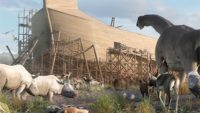“one day is as a thousand years” is often used as an excuse for not believing in literal creation days, but this passage is actually a warning for creation compromisers. Read More
By Dr. Danny R. Faulkner Fifty years ago, Neil Armstrong stepped out onto the moon and uttered the memorable words, “That’s one small step for [a] man, one giant leap for mankind.” …read more Source: AIG Daily
Hello CMI! Please feel free to point out any logical problems in my questioning, as I am not well versed in argumentation. Rather, please see that I am genuinely curious to understand more about our Lord. I understand that God has no limitations outside of Himself, so does this mean that God’s character is fixed? In other words (this is where the logical issues may apply), does God choose to be loving and merciful? Read More
By Ken Ham Here at the Ark Encounter and the Creation Museum in Northern Kentucky, we’re still in the middle of our busy summer season, seeing thousands of guests visiting each attraction every day. But time goes by fast—fall will be here before we know it! If you weren’t able to come to the Ark Encounter and the Creation Museum this summer, consider visiting us this fall—there are even some benefits that come with visiting during that time of year. During the fall, you’ll find cooler temperatures, allowing you to explore the grounds, zoos, playgrounds, and the museum’s botanical gardens [More]
By Sarah Chaffee Do we have 99% of our DNA in common with chimps? On this episode of ID the Future from the vault, Dr. Ann Gauger discusses human and chimpanzee genomes. What is a genome? How is it sequenced? And what is a better estimate of the similarity between our genome and that of chimps? For more on this topic, see the book Science and Human Origins. Your browser does not support playing Audio, please upgrade your browser or find our podcast on podOmatic Download Episode …read more Source: id the future
By Ken Ham A common atheistic objection to God’s Word is the accusation that God condones slavery and rape. They will often bring up this objection as a way of saying that the Bible is supposedly an immoral document and therefore we shouldn’t read it, let alone follow or believe it. But is that a good objection? It flows from a misunderstanding of what the biblical text actually teaches about these issues. Well, it flows from a misunderstanding of what the biblical text actually teaches about these issues. You see, many atheists have never read the Bible for themselves or [More]
By Michael Newton Keas On this episode of ID the Future, Rob Crowther discusses controversy in the science classroom with Senior Fellow and historian of science Dr. Michael Keas, author of the recent book Unbelievable: 7 Myths about the History and Future of Science and Religion. Listen in as Keasdiscusses various areas of controversy, and advises teachers that “science is best taught as science is best practiced.” Your browser does not support playing Audio, please upgrade your browser or find our podcast on podOmatic Download Episode …read more Source: id the future
Why CMI talks about theology as well as science. …read more Source: creation.com
By Ken Ham When you think of the animals on board Noah’s ark, what comes to mind? Probably giraffes, elephants, monkeys, and a dove. But sometimes reality is so much more interesting than our imagination! And the latest issue of our award-winning magazine (this year we won the top magazine award from the Evangelical Press Association), Answers, gives you a peek into the ark to see some unexpected passengers—animals you can see for yourself (sculpted versions, anyway) on the life-size Noah’s Ark at the Ark Encounter, south of Cincinnati. You’ll get the latest in science and culture news through the [More]
By Ken Ham For years, we’ve been selling my book, co-authored with Dr. Charles Ware, This book deals with the well-documented evolutionary origins of the rise of modern-day racism. It shows how these dangerous ideas infected society and created a false dichotomy of “us vs. them”—one race versus another. But that’s not how the Bible talks about race at all! In a biblical view, we’re all one race. We’ve all descended from Adam and Eve, and therefore all of us are part of one biological race, the human race. And, because we’ve all descended from Adam, we’re all sinners in [More]
By Ken Ham A common argument made by skeptics against the truth of God’s Word is that there are two different Gods in the Bible—the supposed harsh God of the Old Testament and the kind, loving God of the New Testament. But is that a good argument? When you read through the Bible and see what it actually reveals about God both in the Old and the New Testaments, you will clearly see the same God. Not at all. When you read through the Bible and see what it actually reveals about God both in the Old and the New [More]
By Ken Ham Something exciting is always going on at Answers in Genesis. Whether it’s a new update or expansion at one of our world-class attractions, an exciting new resource, or a major announcement, we want you to stay in the know. And there are several ways you can do that. Whether it’s a new update or expansion at one of our world-class attractions, an exciting new resource, or a major announcement, we want you to stay in the know. The first is by signing up for Answers Insider, our print newsletter. This monthly publication keeps you up to date [More]
How Creation magazine helped shape one man’s theology. …read more Source: creation.com
Learn how to ask The Big Question when dialoguing with skeptics and unbelievers. …read more Source: creation.com
Only an ‘ethicist’ could ask the question ‘Would the world be better off without humans?’ …read more Source: creation.com
By Marcos Eberlin On this episode of ID the Future, Andrew McDiarmid continues his conversation with distinguished Brazilian scientist Marcos Eberlin, author of close to 1,000 scientific articles and the Nobel laureate-endorsedForesight: How the Chemistry of Life Reveals Planning and Purpose. Their topic again is the body’s surprisingly sophisticated, all-or-nothing system for flushing bad bacteria from our guts. It took foresight to solve all the problems involved; it took foresight even to make protein chemistry work in the first place. “Let’s listen to the data,” says Eberlin. “Let’s surrender to the evidence” — which points to intelligent design. Your browser [More]
By Marcos Eberlin On this episode of ID the Future, Andrew McDiarmid talks with distinguished Brazilian scientist Marcos Eberlin, author of the Nobel laureate-endorsed Foresight: How the Chemistry of Life Reveals Planning and Purpose, about–of all things–diarrhea, the body’s surprisingly helpful (and sophisticated) system for flushing out that bad stuff. The system requires (and happily has) a support system for preserving the good stuff. But it’s an all-or-nothing system requiring great selectivity and fine-tuning. Evolutionist Jerry Coyne says blind evolution could have done it all. But Eberlin says that a knowledge of the relevant chemistry and physiology strongly suggests otherwise. [More]
Twelve Stones Christian Academy in Erlanger, Kentucky is celebrating its third year and is announcing that it is now part of the Answers in Genesis family! …read more Source: AIG Daily
By Ken Ham The Nicene Creed was written and adopted at the First Council of Nicaea in AD 325—well over 1,500 years ago. Since then, it has been repeated in many churches all around the world, including in an Episcopal Church in Maine, USA, recently. But the writers of the Nicene Creed certainly wouldn’t recognize one part of what was quoted in that church. The Nicene Creed reads, in part, And we believe in the Holy Spirit, the Lord, the giver of life. He proceeds from the Father and the Son, and with the Father and the Son is worshiped [More]
There are many strong arguments for Creation, but some are not so strong, and others are totally unsound. It’s important to know the difference. This is why it’s important to keep up with current creationist literature. There is so much good evidence for Creation that there is no need to use any of the ‘doubtful’ arguments. …read more Source: creation.com
By Ken Ham It takes hundreds of people (over 1,000 during our peak times) to operate Answers in Genesis, the Creation Museum, and the Ark Encounter. We so appreciate all of our employees as they do an amazing job making our two attractions wonderful places to visit, producing all our Answers in Genesis resources, keeping the ministry running smoothly, and so much more. And we want you to join the team! We’re hiring at AiG, the Ark Encounter, and the Creation Museum in many different departments. One specific department we’re looking for several hard-working individuals is culinary services at both [More]
By Harry F. Sanders, III Unfortunately for the average American, the scientific media is not much more trustworthy than the rest of the media. …read more Source: AIG Daily
By Ken Ham The intro of an article from the University of Washington sounds like it could be the beginning of a biblical creationist article. The author writes, “Paleontologists are trying to dispel a myth about what life was like when dinosaurs roamed the Earth. The false narrative has wormed its way into books, lectures and even scientific papers about this long-ago era.” Well, there are certainly a lot of myths and false narratives about the so-called time of the dinosaurs! Here are just a few of those false narratives: Dinosaurs died out 65 or so million years ago. Dinosaurs [More]
By Ken Ham Answers in Genesis is partnering with our friends at Children’s Hunger Fund to provide one million meals for hungry children right here in the United States. …read more Source: AIG Daily
By Sarah Chaffee On this episode of ID the Future from the vault, author Bruce Buff shares about his novel, The Soul of the Matter, which has drawn attention from Barnes & Noble and Publisher’s Weekly. Find out more about the book on ENV. Your browser does not support playing Audio, please upgrade your browser or find our podcast on podOmatic Download Episode …read more Source: id the future
By Mark Coppenger The secularization of our culture has created a maze of questions about the best way for Christians to be a shining testimony for Christ. …read more Source: AIG Daily
By Sarah Chaffee On this episode of ID the Future, Discovery Institute Senior Fellow Jay Richards speaks with astrobiologist Guillermo Gonzalez about new research just reported in the Astrophysical Journal. The research suggests that the circumstellar habitable zone for terrestrial planets around stars is narrower than previously thought. This zone around stars, often referred to as the “goldilocks zone,” is where planets are not too hot and not too cold to support liquid water on the surface and, with it, complex life. But there’s another factor, previously underappreciated, which greatly curtails how much further a planet can be situated from [More]







































